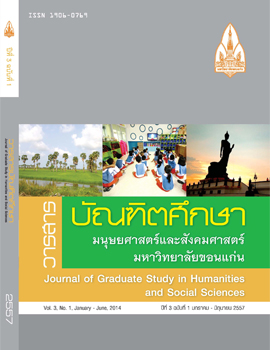แนวทางการพัฒนาศาสนทายาทที่พึงประสงค์ในพระพุทธศาสนา
คำสำคัญ:
ศาสนทายาท, พระพุทธศาสนาเถรวาท, Religious Heirs, Theravāda Buddhismบทคัดย่อ
การศึกษาวิจัยเรื่อง แนวทางการพัฒนาศาสนทายาทที่พึงประสงค์ในพระพุทธศาสนา มีวัตถุประสงค์ 1) เพื่อศึกษาสภาพการพัฒนาศาสนทายาทของเขตการปกครองคณะสงฆ์จังหวัดขอนแก่น 2) เพื่อศึกษาแนวคิดในการพัฒนาศาสนทายาท 3) แนวทางการพัฒนาศาสนทายาทที่พึงประสงค์ในพระพุทธศาสนา การวิจัยนี้เป็นการวิจัยเชิงคุณภาพโดยศึกษาจากพระไตรปิฎก อรรถกถาคัมภีร์พระพุทธศาสนาอื่นๆ เอกสารวิชาการทางพระพุทธศาสนา งานวิจัยที่เกี่ยวข้องและศึกษาจากภาคสนามด้วยการสังเกต การสัมภาษณ์บุคคลกลุ่มต่างๆ เช่น พระสงฆ์ ผู้บริหาร ประชาชน และการร่วมรับฟังการบรรยายพิเศษตามโอกาสต่างๆ แล้วนำข้อมูลมาวิเคราะห์โดยวิธีเชิงพรรณนา จากนั้นได้สังเคราะห์เป็นแนวทางการพัฒนาศาสนทายาทที่พึงประสงค์ในพระพุทธศาสนา
ผลการวิจัยพบว่า สภาพการพัฒนาศาสนทายาทในเขตการปกครองคณะสงฆ์จังหวัดขอนแก่น เป็นการพัฒนาในลักษณะการจัดการศึกษาพระปริยัติธรรมซึ่งเป็นการศึกษารูปแบบพิเศษ มี 3 แผนก คือ แผนกธรรม แผนกบาลี และแผนกสามัญศึกษา การจัดการศึกษาของสถานศึกษาดำเนินไปตามนโยบายรัฐและมหาเถรสมาคม มีสำนักงานพระพุทธศาสนาแห่งชาติและกระทรวงศึกษาธิการคอยกำกับดูแลด้านหลักสูตร ด้านการวัดผลประเมินผลและการจัดสรรงบประมาณ ส่วนการบริหารจัดการให้เป็นหน้าที่ของเจ้าอาวาส ในการพัฒนาศาสนทายาทให้มีคุณลักษณะที่พึงประสงค์ ต้องให้ได้รับการพัฒนาคุณลักษณะด้านวิชาการและการศึกษาเชิงพุทธโดยบูรณาการเข้ากับทฤษฎีไตรสิกขาของพระพุทธเจ้าทฤษฎีแรงจูงใจและทฤษฎีบุคลิกภาพของนักจิตวิทยาสมัยใหม่
แนวทางในการพัฒนาศาสนทายาทที่พึงประสงค์ในพระพุทธศาสนานั้น พบว่าแนวนโยบายการจัดการศึกษายังขาดการวางแผนร่วมกัน การจัดกระบวนการเรียนการสอนยังขาดความเข้าใจในการนำทฤษฎีการศึกษาและทฤษฎีจิตวิทยามาใช้ในการสร้างแรงจูงใจสร้างความมุ่งมั่นที่จะศึกษาให้สำเร็จ การศึกษาแผนกธรรมและแผนกบาลีเป็นการศึกษาเฉพาะทางยังไม่บูรณาการกับศาสตร์สมัยใหม่ การพัฒนาคุณลักษณะที่พึงประสงค์ให้ศาสนทายาทเกิดการเรียนรู้และประพฤติตนตามหลักศีลาจารวัตรและการพัฒนาบุคลิกภาพยังไม่เป็นไปตามมาตรฐานที่สังคมจะยอมรับได้จึงได้เสนอแนวทางพัฒนาใหม่ตามกระบวนการ PTCC Model มองผ่านระบบการประกันคุณภาพและมาตรฐานการศึกษา ตามกฎกระทรวงศึกษาธิการ พ.ศ. 2553
A Way of Development of Satisfied Religious Heirs in Buddhism
The dissertation, “A Way of Development of Satisfied Religious Heirs in Buddhism” had three main purposes: (1) to study the conditions of developing the satisfied religious heirs within areas of Khonkaen ecclesiastical administration, (2) to study a concept and principles of developing the satisfied religious heirs, (3) to study a way of developing the satisfied religious heirs in Buddhism. This was a qualitative research to collect all data from Tipitaka, other Buddhist books, academic paper in Buddhism, related researches, and a field work with observation and interview with many persons: monks, administrators, and people through listening to the special lecture in many chances. The collected data was analyzed with the descriptive analysis in order to give a way of development of the satisfied religious heirs.
A result of this study was found that the state of developing the satisfied religious heirs within areas of Khonkaen ecclesiastical administration was in the form of Phrapariyattidhamma, special education in three sections: Dhamma, Pali and ecclesiastical secondary schools. These educational institutions followed the policy of the Thai Sangha Supreme Council, greatly supported by the Office of Natural Buddhism and the government’s policy, greatly examined by the Ministry of Education in accordance with content, curricular, evaluation, assessment, and budget allocation. Similarly, the educational management was given the abbot of the Buddhist temple. The aspects of concept and the development of satisfied religious heirs were found that the development of the satisfied religious heirs was managed with the growth of an academic and Buddhist study in accordance with the Buddha’s principle of Threefold Training integrated with the theory of motivation and the theory of personality mentioned by the modern psychologists.
Ways of developing the satisfied religious heirs in Buddhism was found that the policy of educational management was made without any cooperative plan in developing the satisfied religious heirs. The management of the learning-andteaching process was done without any clear understanding to take the educational theory and the psychological theory to encourage students to finish their education. The management of the Dhamma and Pāli curriculum was a special study without any integration with modern sciences. The development of personality among the satisfied religious heirs came from learning and following the morality and then, the development of personality was not seen according to the standard accepted by all societies. In this research, there were some new suggestions according to the PTCC Model through the systematic theory as well as the 2010 educational assessment and standard according to the rule of the Ministry of Education.







